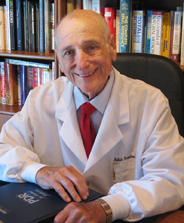Health Care for All - Fact or FantasyPowerful Patient, 2010 Week 4Host: Joyce Graff, http://powerfulpatient.org, editor@vhl.org 800-767-4845
About our Guest
Melvin Kirschner, MD spent nearly 60 years working in the American health care system. The first 10 years were in the Public Health field and then 47 years as a family practitioner and Biomedical Ethicist.
Dr. Melvin Kirschner is the author of "All Medicines are Poison! Making Your Way Through the Medical Minefield." He is a member of the American Medical Association, American Public Health Association and the American Academy of Family Physicians.
http://www.allmedicinesarepoison.com
About our Healthcare System
Dr. Kirschner feels that the United States health care system is broken. He writes,
“We are told that statistically our health care is 37th in the world.
“My personal observation is that there are parts of our health care system that are the most innovative, advanced and best in the world! However, many of our people do not benefit from these innovations. It's estimated that 47 million people in the U. S. have no medical insurance. Many of those people can't afford care at all. Those that need care often go to an overcrowded emergency room, the most expensive place in our country to get medical care. “Many people cannot afford preventive care.
“It's estimated that more than half of our country's citizens and doctors recognize this inequity and are in favor of ‘health care for all,’ one form of which is single payer medical care insurance.
“I believe that ‘health care for all,’ should not limit insurance coverage because of ‘prior existing conditions.’ Paid-for preventive medicine services should be part of the coverage provided by the plan.
“Our population will live longer, healthier lives if people had periodical preventive medical examinations and immunizations. It would only be necessary to visit the very expensive emergency rooms for truly serious emergencies.
“For this to happen our entire population must have medical insurance; ‘health care for all.’ It could be private medical insurance, a combination of private and government, or a single payer government system such as Medicare. I personally favor the Medicare model one set of rules, one method of payment and one list of what the plan agrees to pay for.
“Another issue is the cost of the health care system in the United States, even for people who have Medicare coverage and have chosen to enroll in the Part D prescription drug option.
“The Part D prescription drug option offered seniors who were on Medicare a way to save money on their prescriptions. This piece of legislation was rammed through Congress by pressure from the drug industry's lobbyists. At first it failed, but it was finally passed well after the Congressional usual time of adjournment. Shortly thereafter, those same lobbyists were employed by the pharmaceutical industry at a very substantial salary.
“Part D, the law that was supposed to save the seniors money on medicines, was indeed helpful for patients who used large amounts of very expensive prescriptions. But many seniors use small to moderate amounts of medicine. Many people use no prescriptions at all, but if they enlisted in the program, they were required to pay a monthly fee. If they chose not to enroll, the fee level increased monthly until they did decide to enroll.
“There were rules in the law that I considered onerous. Some patients discovered that medicines sold in other countries were much less expensive than the identical medicine sold in the U. S.
“If they imported their medicines, they could save a significant amount of money. Part D prohibited the importation of medicines. The Post Office started to confiscate incoming medicines but soon decided to discontinue that practice. As far as I know the imported medicine ban, may still be in the Part D law.
“Another thing Part D did was to arrange for the ‘for profit’ insurance industry to create prescription drug intermediaries that obtained medicines from the pharmaceutical manufacturers. At times, the exact medicine I prescribed was not on the insurance company’s formulary. Part D was aware that might occur and permitted five levels of appeal, a process I renamed 'five levels of no!!!' In a short time the cost of medicine increased significantly.
“We are told by some that the U. S. has the best medical care in the world. It's innovative, inventive; its practitioners are better educated and more resourceful than any county in the world. I agree that is probably true. But only the wealthy can afford that level of care. Cancer, heart disease and other serious medical problems have driven thousands of our people into bankruptcy.
“I became a doctor to help people. I've enjoyed the degree of respect that no other profession can equal. When I was still in practice, nobody left my office without being cared for or referred to a place where they could receive the care that they needed. I am my brother's keeper and my sister's keeper too.
“This Country must have a single payer ‘health care for all’ medical care system. The citizens of almost every industrialized country in the world have medical care for all. Why doesn't this Country have such a plan?”
|
